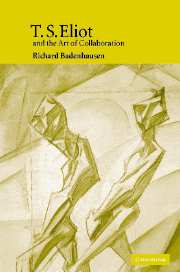Book contents
- Frontmatter
- Contents
- Acknowledgments
- List of abbreviations
- Introduction – Reaching the stillness of music
- 1 “Speaking as ourselves”: Authorship, impersonality, and the creative process in the early essays
- 2 A conversation about “the longest poem in the English langwidge”: Pound, Eliot, and The Waste Land
- 3 “Helping the poets … write for the theatre”: The transitional essays on collaboration, community, and drama
- 4 A dramatist and his midwives: Eliot's collaborations in the theatre
- 5 The Possum and the “creating critick”: Eliot's collaboration with John Hayward
- Conclusion – Placing collaboration in perspective: Voice and influence in the late essays
- Notes
- Index
Conclusion – Placing collaboration in perspective: Voice and influence in the late essays
Published online by Cambridge University Press: 22 September 2009
- Frontmatter
- Contents
- Acknowledgments
- List of abbreviations
- Introduction – Reaching the stillness of music
- 1 “Speaking as ourselves”: Authorship, impersonality, and the creative process in the early essays
- 2 A conversation about “the longest poem in the English langwidge”: Pound, Eliot, and The Waste Land
- 3 “Helping the poets … write for the theatre”: The transitional essays on collaboration, community, and drama
- 4 A dramatist and his midwives: Eliot's collaborations in the theatre
- 5 The Possum and the “creating critick”: Eliot's collaboration with John Hayward
- Conclusion – Placing collaboration in perspective: Voice and influence in the late essays
- Notes
- Index
Summary
The essays written during the wartime years and the two decades following Four Quartets often seek to make sense of the collaboration Eliot had engaged in during the first twenty-five years of his career. Having benefited enormously from the assistance of both living and dead collaborators, Eliot used many of these essays to step back from that experience and place it in personal, historical, and theoretical contexts. Those essays, for example, are overly preoccupied with questions of voice and influence. They continue the early attempts to pin down the author's place within the creative act and maintain the prejudice of refusing to accept too much responsibility for the generation of imaginative material. Even to the end, Eliot configured himself as an author not in complete control of his language and one who forever looked outside himself for stabilizing figures. But most remarkably, these essays consistently express fear and bewilderment toward the created text, and they most often represent poems as unruly children who are out of reach of their paralyzed parent.
Eliot's late essays often take up subjects that had occupied the writer throughout his career. But they sometimes do this from a slightly different position. For instance, he adapted the model of authorial passivity to accommodate the religious vocabulary that became so prevalent in his essays in the second half of his life.
- Type
- Chapter
- Information
- T. S. Eliot and the Art of Collaboration , pp. 213 - 223Publisher: Cambridge University PressPrint publication year: 2005

